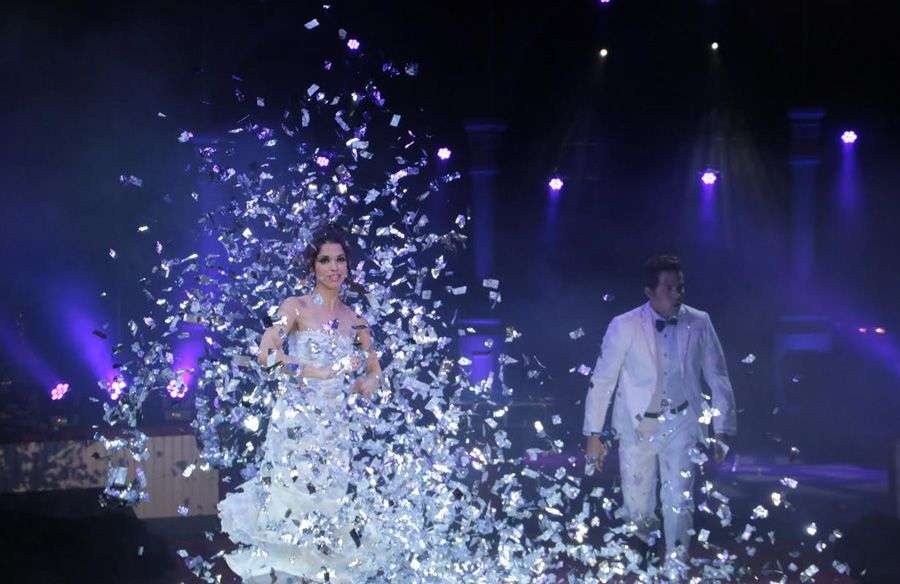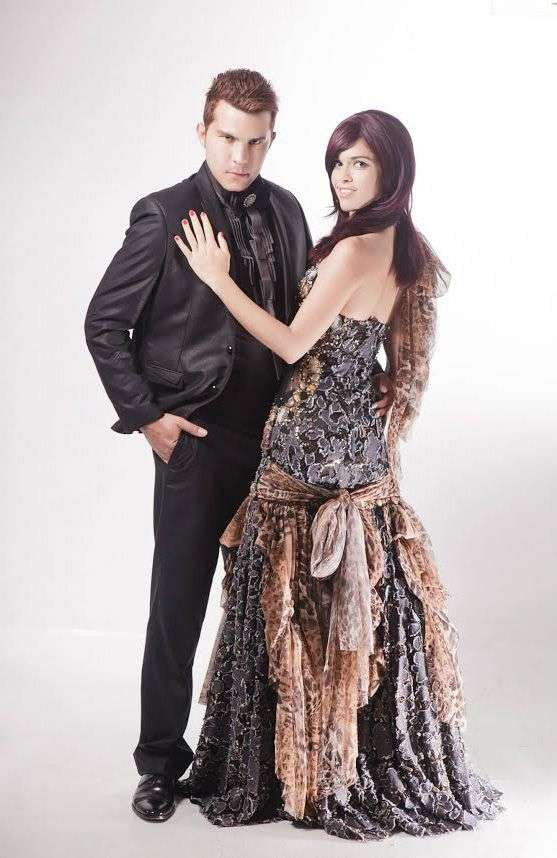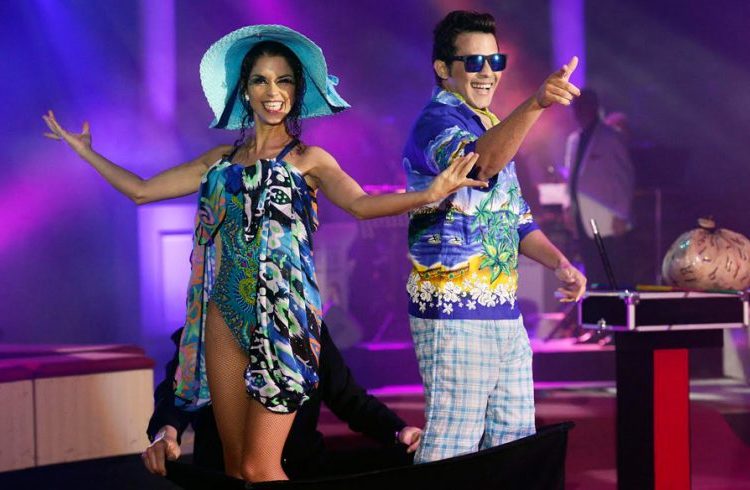With the unique voice and tone of circus presenters, and in English with an evident Russian accent, the Ringmaster announces them: “From sensual and rhythmic Havana Cuba, please welcome Sixtooooo & Lucíaaaaaa!”
The public bursts out in applause and I, whose chauvinistic pride is stirred, applaud stronger than anyone there. Like in a radio program, in comes the Latin music and, almost at the same time, in come the artists. Everything happens very fast. I don’t even have time to think of how happy my boyfriend would be if I could dress at that speed.
Sixto and Lucía are Cuban magicians residing in Cuba with more and better international projection. King and queen of the quick change, an illusionistic modality unprecedented on the island, they have performed with the world’s most important circus companies.
From China to Moscow, and through Latin America, they have won ovations, awards and, by pure work, the right to be in the Grand Cabaret, the French magic program in which every magician wants to be. The mecca of magic, we could say.
Lucía is from Guanabacoa and she can’t deny it. Extroverted, expressive, “I’m from the land of artists,” she says with pride. Wherever he goes Sixto carries with him what he learned in Valle de Picadura, Madruga.
A professional couple as well as in life, Sixto and Lucía spoke to OnCuba minutes before their show with the Great Moscow Circus in the South African city of Johannesburg.

Why did you choose the quick change?
Sixto: I had been a magician for a long time. In Cuba we magicians did the same thing since we all had more or less the same products available for magic…. Since we don’t have magic shops, we make our own products. One day when I was with Lucía, returning from Haiti after the earthquake, we decided to change the direction of what we were doing. We liked that subject of quick change and we made up our minds.
How did you learn to do it?
Sixto: There was a video in Cuba of a quick change couple, an international couple. The video had spread around in cell phones and magicians really know the secrets. We found a dressmaker and we started.
Lucía: We also invented a bit, we some vision but they are very old secrets and we added a bit of what we thought it was. In fact, I don’t know if we invented a technique or we modernized it, but it really worked for us and we have maintained it up to now.
When you performed in Russia, you won the bronze prize in the 2015 International Circus Art Festival of Izhevsk. On several occasions you have said that this is a gold prize for you. Why?
Lucía: The Russians modernized and made popular the quick change in the 1960s and 1970s, the Russian public is a great connoisseur of this number, it’s not like other countries where we have performed and we become aware that the public hasn’t seen this type of live performance. Not in Russia, in Russia the public knows it and is very jealous about it.
When the Cubans arrived to present a number that they feel very much is theirs, we said to ourselves “let’s see what happens.” And not only was the public’s reaction really good but we even won a prize.
Despite the fact that today you have traveled through more than 18 countries, Haiti’s experience continues being mentioned a lot….
Lucía: Haiti was the first international experience we had, it was different from the others and is one of the most important we have had. We went to Haiti for 41 days as volunteers with the Martha Machado brigade, to a country where after the earthquake around a quarter of a million persons had died.
We worked in hospitals, in camps…we even worked in a camp that was located close to the common grave, where thousands and thousands of persons had been buried. We would get to an orphanage and we would see sad children, crying, mutilated. They had lost their parents, their grandparents or a friend. We worked and they would end up laughing.
We went as volunteers. What motivated us was to make the people happy. Every night we would go to bed and we would say, wow, today we did something for someone.
That’s being an artist, isn’t it?
From there to a stage that seems is the dream of all the world’s magicians, the Grand Cabaret. How did that happen?
Sixto: We like all magicians dream with standing on that stage because it is really the top. One day a friend said to us “hey, your act is already like for the Grand Cabaret, why don’t you send it?” We said, “no, we’re going to wait to see if our act is up to that, if they seek it.”
Precisely as we were leaving Russia’s Festival, Lucía was on the Internet and she was smiling. She said to me: guess from where we got a message. I started giving her names and she said: no, from the Grand Cabaret.
Moreover, what was curious is coming from Cuba. Other Cuban magicians had arrived but they lived in other countries. It was a myth. Once we were going on a tour in Cuba and a young magician said to us that “to go to the Grand Cabaret you have to live outside Cuba.” And we said no, that to go to the Grand Cabaret what was necessary was to have a good act.
And later life proved us right. We were the first magicians living in Cuba who got to the Grand Cabaret.
Lucía: It’s a stage where all the world’s magicians want to set foot on. In just a month everything was arranged. When we got there we were in the middle of the program and when we rehearsed and they saw our act they put us to open the program because they wanted to really start on top. The public completely stood up, they shouted Cuba! Cuba! That ended with a standing ovation.
Sixto: Being on a stage where you saw great maestros you grew up admiring was spectacular for us.
Is it true that you met in Carlos III handing out cards?
I used to work in Havana’s theater center, but in addition I worked for birthdays and private parties. One day I was giving out cards in Carlos III’s piñata shop and I met Lucía there, doing the same thing. Curiously we both went that day. We started talking about what we did. Afterwards we started working together.
From that day in Carlos III to being at the top of world magic…. How do you live after being in that place? Can you believe it?
Lucía: When we read in an article “Sixto and Lucía, ambassadors of Cuban magic” or when we see that the Great Moscow Circus calls us Cubans to do a quick change in a Russian show, we believe that what we are doing is OK. And actually, the work proposals don’t stop; they call us with a year in advance.
Sixto: But where we really believe it is on stage, when I give my art to the public. In my life I’m still that same boy from Valle de Picadura.
Lucía: At that moment it’s only us.
What do you do so the show doesn’t get old? How is a magician trained?
Sixto: Like a musician. I compare it to a pianist, to a guitarist; a lot of rehearsal, a great deal of searching for information. We study a lot what is done in the world in quick change; that study doesn’t stop. It doesn’t matter that it’s the same country, each show is unique. And on stage we move in a very short time according to the public’s reaction. Each presentation is unrepeatable.

With that amount of work how do you maintain the link with Cuba, with the Cuban circus?
Lucía: In 2015 we formed part of the celebrations of the Kasajo circus, they asked for one of our numbers, despite that it was a completely Kasajo show. We finished in mid-August and arrived in Cuba one day and the following we joined the Circuba tour.
Each time we have the opportunity to be in our country we try to perform in some event, because we want to maintain the link with the Cuban public. In 2016 the Union of Writers and Artists of Cuba gave us the Montalvo Award to the best work of the year, and it was the first time that award was given. It filled us with pride.
Sixto: One of our big dreams is to have a show in Cuba that is completely ours; not just a quick change but also where we do other things, since we have great illusions, an entire show, perhaps with some guest, but that it be our magic show. Let’s hope we achieve this one day.










